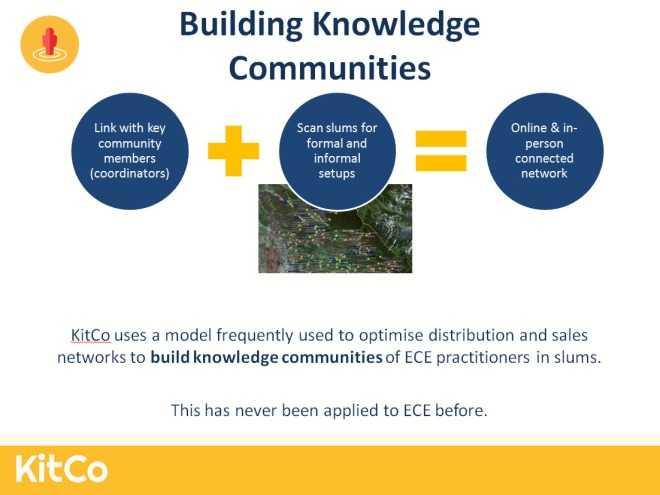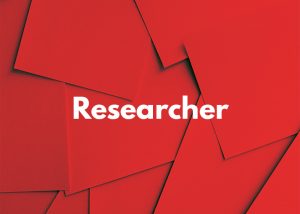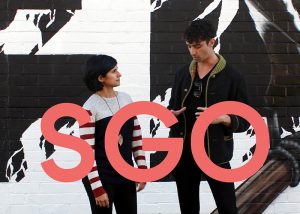What role does social enterprise play in today’s society? Is it possible that every business has the potential to be a social enterprise? Is social enterprise a viable business and social solution for the future?
These are questions I have thought about extensively during the past week I spent in Shanghai competing in the Hult Prize, an initiative of the Clinton Global Initiative and the Hult Foundation. I went over with a team of highly engaged and ambitious students from Griffith University and the Griffith Honours College to pitch our idea of a social enterprise which tackles this Bill Clinton’s 2015 call-to-action – early childhood education (ECE) in slums.

Our understanding of the issue and our proposed social enterprise solution is as follows:
As a group of zealous 20 year olds, our team came together in the wake of the devastating Haiti Earthquake, to provide resources to reconstructed primary schools. It is this experience that forms the foundation of KitCo – the belief that ‘the education of an infant is the greatest tool for the future’.
To solve the Hult challenge, we started in Cite Soleil – widely regarded as the poorest slum in the Northern Hemisphere, and a microcosm for the larger slum structures. If we can validate KitCo in Cite Soleil, one of the most challenging environments in the world, then it can scale, and scale rapidly.
So that’s what we did.
As part of our community consultation process we consulted Fabienne Pierre – a mother of 4, earning less than $5 a day, with both her and her husband working overtime.
The overwhelming feedback was that formal ECE centres are contrary to everyday life in the slums – a flexible, informal solution is required to adapt to changing conditions.
Fabienne, like most families in Cite Soleil, sends some of her children to a trusted relative or community member. These setups are common, with an estimated 50 in the cite soleil area alone. These are hugely untapped resources of human capital – individuals that are already entrepreneurial, that are already respected, and that already have reach into young children’s development.
Money isn’t currently paid for this service, however it is clearly promoted as a form of ‘child minding’ rather than education, and parents like Fabienne would pay if the setup included educational components. A key barrier to this recognition as an education experience is the stimulation vacuum that occurs in this setting – no toys, no equipment, just pure child minding.
There is no way to effectively measure these setups, all we know is that there are many of them, and they are already reaching a significant proportion of the children in slums. But they are difficult to locate for parents in the slums, they are difficult to identify, and they are difficult to sustain.
And, whilst high-technology solutions like tablets and computers have come a long way, their durability and appropriateness for the age group is questionable.
Access to education is a systemic, ingrained problem, so we need a systemic, comprehensive solution. This is the most effective channel to reach 10 million students by 2020 – the aim of the Hult Prize.
Our solution, KitCo, is therefore built on three pillars:
Build knowledge communities by mapping both informal and formal early childcare centres;
Provide resources to these knowledge communities – 3D printed kits made from plastic waste that contain Bluetooth enabled activities to stimulate play-based learning in children; and finally
Collect data from these kits to monitor and evaluate these knowledge communities on a micro level, as well as impacting policy on a macro level.
Firstly, why build knowledge communities? Well, currently child minders are isolated, inaccessible and without guidance. We are taking a model used frequently for optimizing distribution and sales networks – and applying to ECE.
Take Coca Cola, for example. When expanding into rural Africa, instead of formalizing proper distribution chains into the slum areas, they provided mobile phones and maps to informal sellers that resulted in a huge boost in efficiency and effectiveness, as the sellers learned from one another, balanced prices, and relocated to appropriate demand areas.
Similarly, the KitCo network will link centres. These centres are the responsibility of regional coordinators, who work with local families and organisations to map the learning community. These ECE centres will benefit by:
- Increasing awareness of their service.
- Involvement in community development events to share experiences.
- Added credibility and trust to their service.
- Increasing access to reliable ECE by providing a network of centres if one is
- Access to the service that allows them to talk to other practitioners.
- Provision of resources.
- Building a more self-sustaining and profitable model.
So next: providing resources. Our play kits are two-fold. First, they address the stimulation vacuum currently existing for ECE in slums, and second, they provide the technical infrastructure to empower and up-skill educators, governments, and others operating within this space.
Play is not only a creative outlet for children; it has proven to stimulate vocabulary, concept building, spatial awareness, and mathematical skill. Exposing a child, as early as possible, to appropriate play activities and materials is important and provides a sound basis for development.
Grounded in the literature and in consultation with industry professionals, we developed a play kit to provide children with the structured and unstructured learning opportunities needed to prepare for entering school. Play kits are adaptable according to individual country or situation, but are based on basic items such as construction blocks and sorting and stacking sets.
But we didn’t want to just add to the accumulation of plastic and discarded toys. Our next biggest challenge to providing these resources was how to provide them sustainably, and in a way that was affordable, efficient and engaged the community.
Our solution is a process we call Clean Ink, which is the process of turning local plastic waste into 3D printer ink and then utilizing that to 3D print our kits. Plastic waste is collected from the slums and is cleaned and ground into a powder. It is then used to create a recycled 3D ink, which is highly durable and cost effective, costing approximately 1/100th of the cost of standard 3D printing. After printing, blocks will be assembled with Bluetooth technology and data sensors embedded.
And after building these knowledge communities, and providing them with resources, we reach our final aspect: the data. Data creates opportunities to empower communities, increase educational outcomes, and improve quality of life and standard of living. Initially, we will focus on using our network and play kits to map location, track hub usage, and monitor play patterns. This data has value on a local, national and global level. Use of this data includes the development and revision of play-based activities, as an early indicator of arising problems, as community leverage for government support and welfare, and for more effective evidence-based policy making.
Data collection is easy. Our Bluetooth enabled play kits record data. This data is collected by a nearby phone or computer. It is then uploaded to the online portal, where it is compiled and able to be analysed. Data is then used to enact change and improve ECE through analysis, evaluation and monitoring.
We have already built a functioning education portal, based on the Go Catalyse system developed by one of our team members, Chris Eigeland. It provides a platform for collating and disseminating data. Data can be uploaded automatically via a 3G network, an internet connected device, or using basic mobile phones via SMS. Devices are also able to request information from the system, such as the location of the nearest ECE centre.
Data is so pivotal to providing an effective solution because extremely limited data currently exists on ECE in slums; it allows us to evaluate efficacy; it is pivotal to increasing educational outcomes through real-time monitoring and adaptation; and there are significant economic benefits of collecting reliable and up-to-date data.
So at the end of the day KitCo builds knowledge communities; KitCo produces tactile, sustainable resources, with a technology value addition, and; KitCo mobilises change through data.
We are targeting a market that is already in place, and empowering them to increase their reach and find economic stability. We enable education entrepreneurs to receive consistent income, and have an alternative revenue source for the company, the data. We will achieve local impacts on education access and standards, and have the potential to impact widespread policy and research.

Although we didn’t win, it was an excellent experience to see what other young thinkers and changers from around the world are doing and are capable of – and to network with them to collaborate in the future. We have the A Grade team, now we just need to finesse this into our A Grade idea.
If you are interested in our solution, or want to know more, you can email kitcoteam@gmail.com or check out our Facebook and Twitter.
Team: Chris Eigeland, Janna Mallon, Brad McConachie, and Elise Stephenson









